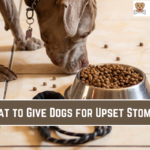10 Critical Impacts of Skipping Meat in Your Dog’s Diet-Skipping meat in your dog’s diet can have significant implications, both positive and negative. As more pet owners explore vegetarian and vegan options for their furry friends, understanding the critical impacts of a meat-free diet becomes essential. From potential nutritional deficiencies to behavioral changes, a meat-free diet can affect your dog’s health and well-being in various ways. This blog will delve into the ten critical impacts of skipping meat in your dog’s diet, providing valuable insights and practical tips to ensure your pet remains healthy, happy, and well-nourished.
10 Critical Impacts of Skipping Meat in Your Dog’s Diet
-
Nutritional Deficiencies
- Protein Deficiency:
- Impact: Essential for muscle development, immune function, and overall health.
- Symptoms: Weight loss, muscle wasting, and weakened immune response.
- Amino Acid Imbalance:
- Impact: Essential for repairing tissues and enzyme function.
- Symptoms: Poor coat condition, lethargy, and digestive issues.
- Vitamin B12 Deficiency:
- Impact: Important for nerve function and red blood cell production.
- Symptoms: Fatigue, neurological issues, and anemia.
- Iron Deficiency:
- Impact: Crucial for oxygen transport in the blood.
- Symptoms: Weakness, pale gums, and lethargy.

-
Digestive Issues
- Increased Fiber Intake:
- Impact: Vegetarian diets often contain more fiber, which can be hard for dogs to digest.
- Symptoms: Gas, bloating, and diarrhea.
- Digestive Upsets:
- Impact: Transitioning to a meat-free diet may cause temporary digestive issues.
- Symptoms: Vomiting, loose stools, and decreased appetite.
-
Weight Management
- Potential for Weight Loss:
- Impact: Meat provides high-quality calories and protein; without it, dogs may experience weight loss.
- Symptoms: Noticeable decrease in body condition and energy levels.
- Nutrient Density:
- Impact: Meatless diets may not be as calorie-dense, affecting a dog’s overall weight and energy.
- Plant-Based Proteins
- Sources: Beans, lentils, peas, and quinoa.
- Benefits: Can provide protein but may need to be combined to offer a complete amino acid profile.
- Considerations: Ensure that the plant-based proteins are well-balanced and digestible for dogs.
-
Fortified Dog Foods
- Commercial Options:
- Benefits: Some commercial vegetarian and vegan dog foods are formulated to meet nutritional needs.
- Ingredients: Typically include plant-based proteins and added nutrients to replace meat.
- Consultation: Always consult with a veterinarian to choose a high-quality, balanced food.
Also read: 5 Effective Techniques to Stop Your Puppy from Biting You
-
Supplements
- Essential Nutrients:
- Types: Vitamin B12, iron, and amino acid supplements can help address deficiencies.
- Consultation: Regular vet check-ups and blood tests can help monitor nutrient levels and adjust supplements as needed.

-
Ensuring a Balanced Meat-Free Diet
- Consult Your Veterinarian:
- Professional Guidance: Before making any changes to your dog’s diet, consult with a veterinarian or a pet nutritionist.
- Health Assessment: Regular check-ups are crucial to monitor your dog’s health and adjust the diet as needed.
- Monitor Health and Behavior:
- Observe: Watch for any signs of nutrient deficiencies or health issues, such as changes in coat condition, energy levels, and overall behavior.
- Adjustments: Be prepared to make dietary adjustments based on your dog’s health and responses.
- Special Considerations for Puppies and Senior Dogs
- Puppies:
- Growth Needs: Growing puppies have higher nutritional requirements; ensure their meat-free diet meets these needs.
- Consultation: Work closely with a vet to ensure proper growth and development.
- Senior Dogs:
- Health Monitoring: Older dogs may have specific dietary needs; a meat-free diet should be carefully balanced.
- Adjustments: Regular health evaluations are essential to manage age-related health issues.
-
Behavioral Issues
- Chewing:
- Cause: Insufficient nutrients or boredom can lead to excessive chewing.
- Solution: Provide appropriate chew toys and ensure a balanced diet.
- Excessive Digging:
- Cause: Boredom, anxiety, or lack of proper nutrition.
- Solution: Ensure adequate physical exercise and mental stimulation.
- Stealing Food:
- Cause: Hunger or nutritional deficiencies may cause food-stealing behavior.
- Solution: Regular feeding schedules and appropriate portion sizes.
- Hyperactivity:
- Cause: Imbalanced diets or lack of essential nutrients can lead to hyperactivity.
- Solution: A balanced diet and adequate exercise help manage energy levels.

Also read:Pit Bull Vs. German Shepherd Comparison [Updated 2025]
-
Case Studies and Research
- Studies on Meat-Free Diets:
- Findings: Some studies suggest that dogs can thrive on well-balanced vegetarian or vegan diets, but more research is needed.
- Examples: Case studies of dogs on meat-free diets indicate that, with proper planning, they can maintain health and vitality.
Conclusion
A meat-free diet for your dog can be successful with careful planning and proper nutritional support. 10 Critical Impacts of Skipping Meat in Your Dog’s Diet-By understanding the potential impacts and working closely with a veterinarian, you can ensure that your dog remains healthy and happy. Always monitor your dog’s health and behavior to make necessary dietary adjustments and consider fortified foods and supplements to address any nutritional gaps.
FAQs
Can dogs be healthy on a meat-free diet?
Yes, dogs can be healthy on a well-balanced meat-free diet, but it requires careful planning to meet their nutritional needs.
What are the risks of a meatless diet for dogs?
Risks include nutritional deficiencies, digestive issues, and potential weight loss. Regular veterinary check-ups can help mitigate these risks.
What should I include in a meat-free diet for my dog?
Ensure it includes plant-based proteins, fortified dog foods, and necessary supplements to meet all nutritional requirements.
How can I transition my dog to a meat-free diet?
Gradually introduce the new diet, monitor for any adverse effects, and consult with a vet to ensure a smooth transition.
Are there specific brands of meat-free dog food recommended?
Consult your vet for recommendations on high-quality, nutritionally balanced meat-free dog foods.


